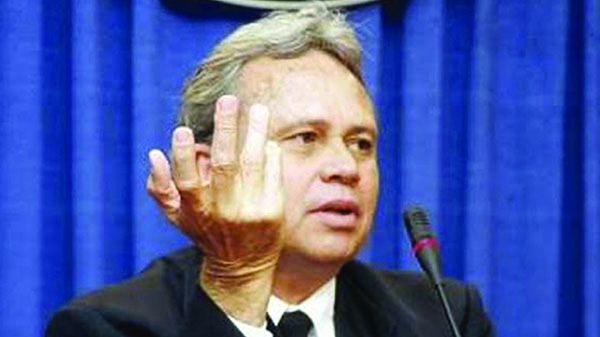PORT OF SPAIN, Trinidad CMC – The Trinidad and Tobago government Monday presented a TT$62.8 billion (One TT dollar =US$0.16 cents) budget to Parliament outlining a host of new taxes including, a 15 per cent increase on gasoline and diesel prices that went into effect immediately as the new Keith Rowley government seeks to revive an ailing economy.
But Finance Minister Colm Imbert who called on both the private sector and the trade union movement to help the new People’s National Movement (PNM) government rebuild an economy that came “perilously close to collapsing,” said the new taxes measures outlined are expected to yield an additional TT$5.2 billion and reduce expenditure by TT$340 million.
He said the budget is supported by “a prudent and realistic oil price assumption of US$45 per barrel and a mixed of gas prices to properly reflect our markets, including Henry Hub of US$2.75 per mmbtu, Indonesia of US$8.00 per mmbtu”.
The Finance Minister announced measures that would assist old age pensioners as well as reduce the Value Added Tax (VAT) from 15 to 12.5 per cent.
In a two hour presentation, Imbert said there would also be an increase in the allowance for personal income tax from TT60,000 to TT$72,000 from January 1 next year that would allow for an additional TT$250 million dollars to be in circulation.
He said the Business Levy Fund would be increased from 0.2 to 0.6 per cent per quarter resulting in revenue of TT$327 million, while the Green Fund will increase from 0.1 to 0.3 per cent bringing in an estimated TT$544 million. Both measures will take effect from January 1, next year.
Imbert, delivering his first ever budget address, said that there would be an increase in the price per litre of gasoline from TT$2.70 to TT$3.11 while diesel will move from TT$1.50 to TT$1.72.
He said the increase, which will result in revenue of TT$340 million would be used to help offset the growing fuel subsidy that between 2011-15 had ballooned to TT$19 billion. Imbert said despite the new price increase, the fuel subsidy is expected to exceed one billion dollars.
The Finance Minister said that the new government which came to office following the September 7 general election, would also be reviewing plans to introduce a Revenue Authority, re-introduce the property tax from January 1, next year –at the old levels and old rates while a new system is being put into place – and provide trades unions with a TT$15 million facility to help build their capacity.
Imbert said that the country intends to secure its revenue base, noting that a “significant leakage in our revenue stream is our inability to capture the full potential of the tax liability of foreign branches of multinational corporations operating in Trinidad and Tobago.
“A majority of the volume and value of the global trade in goods and services is transacted through branches and subsidiaries of multinational corporations. Intra group trade poses significant challenges to taxing authorities as the multinational corporations seek to minimize their global tax liabilities.”
He said the government intends to use the new internationally accepted transfer taxes “thereby constraining multinational corporations to utilize tax mitigating structures including moving transactions to lower tax jurisdictions for lower tax rates”.
Imbert said that the government does not receive its “fair share of taxes” from the gaming industry and he intends to fast track new legislation following consultation with various stakeholders, including churches and law enforcement agencies.
He told legislators that the present public pension scheme system is outdated and that as far back as 2010 significant progress had been made to reform the system.
“Retirees will no longer have to live on meager pensions, “he said, adding that in the interim the government intends to extend and strengthen the viability of the National Insurance System to 2036, warning “if this is not done immediately the National Insurance Fund system will be unable to pay future pensions.
He said he also intends to introduce legislation to increase all earning class limits by 13.5 per cent with the maximum insurable earning class limit increasing from TT$12,000 to TT$13, 600.
“Contribution rates will also be increased from 12 per cent to 13.2 per cent. These adjustments will take effect on July 4 , 2016,” he said, noting that in addition with “our 2015 election manifesto promise, I propose to increase the cap on joint income received by retirees in respect of National Insurance and old age pensions”.
He also announced a number of other incentives for old age people including free drivers licences, free passports as well as discounts on utility bills over the coming months.
Imbert said that farmers will also benefit from the new fiscal measures as the government seeks to ensure food security here.
“We will exempt from all duties and taxes inputs into the agricultural sector including approved chemicals, motor vehicles, approved fishing vessels and equipment…” from January 1 next year.
In his budget presentation, Imbert said he was outlining measures that prior to the 2016 midyear budget review that would at “minimum a fiscal balance by fiscal year 2018.
“In so doing we have sought to balance the burden of adjustment across all sectors in order to close the TT$21.4 billion gap between current revenue and expenditure in 2016”.
He said in the next 12 months, the government plans to generate a deficit of TT$2.8 billion or 1.7 per cent of GDP) Gross Domestic Product),significantly lower than the budgeted deficit for the last five years,” he said.
 Pride News Canada's Leader In African Canadian & Caribbean News, Views & Lifestyle
Pride News Canada's Leader In African Canadian & Caribbean News, Views & Lifestyle





